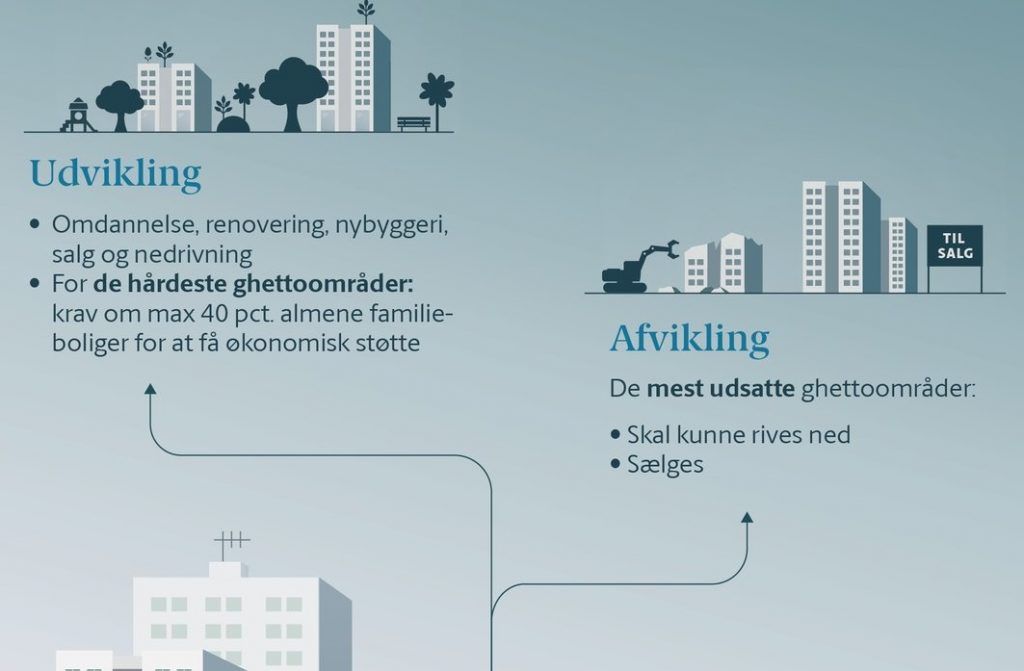Amid demonstrators and a heavy police presence this morning in the Copenhagen ‘ghetto’ Mjølnerparken, the government unveiled its full plan for vulnerable neighbourhoods in Denmark.
The plan, ‘One Denmark without parallel societies – No ghettos in 2030’, consists of 22 initiatives that aim, as the name suggests, to rid the country of ‘ghettos’ by 2030.
“We need to physically and mentally influence people who, despite many years of living in Denmark, have isolated themselves from our society and, in the worst case, work against our fundamental values – values like freedom, equality and judicial security,” said Simon Emil Ammitzbøll, the internal affairs minister.
“In terms of these persons we are cracking the whip with tough initiatives. We have targeted initiatives, so they won’t count for everyone, but only where the problems exist. The goal is clear: families need to take care of themselves, and the kids need to learn Danish and get the best conditions possible to have a good life.”
READ MORE: Crimes in Denmark’s vulnerable neighbourhoods to be punished twice as hard
Four key arenas
Some of the 22 initiatives included physically changing housing areas, lower social benefits for those moving to ghetto areas, more police presence in the same areas, obligatory institutionalisation for kids, and stiffer punishments for crimes committed in certain areas.
The initiatives are dispersed across the four central themes: ‘Physical tearing down and renovation of vulnerable housing areas’, ‘Tougher controls on who can live in vulnerable housing areas’, ‘Strengthened police efforts and stiffer punishments to fight crime and create security’, and ‘A good start at life for all children and youth’.
Read about the entire plan and all initiatives in the strategy here (in Danish).
International food agenda mobilised
On March 2, the food minister, Esben Lunde Larsen, will meet with a number of members of the World Food Summit partnership to discuss a strategy for mobilising leading players around the world under the framework of the UN’s 2030 sustainability goals. The partnership aims to engage politicians, companies, researchers and gastronomical leaders to come up with solutions to global challenges connected with providing better food for more people. On August 30-31, Larsen will host the World Food Summit – Better Food for More People summit.
SheDecides summit in South Africa
Exactly one year after the Danish government helped found the SheDecides movement, the development minister, Ulla Tørnæs, is in Pretoria, South Africa to take part in a SheDecides conference. The SheDecides movement was started following the US government’s decision to no longer financially aid UN organisations that raise awareness about contraception, abortion and planned families. Since launching, some 40,000 people and 150 organisations have joined the SheDecides movement.
Government establishes truck parking limit
The government has teamed up with Dansk Folkeparti to limit the amount of time truck drivers can park in road-side rest areas along the Danish motorways. The new restrictions, which aim to force truckers to take a rest legally away from the motorways, limits the time they can park in road-side rest areas to 25 hours. The limit is significantly higher than the 11 hours initially considered by the government, but also considerably lower than the 45 hours called for by the trucking industry.
Better patent protection proposed
The government has come with a new proposal that will ensure Danish companies have better protection for their patents. The proposal, which was presented to Parliament yesterday, is considered groundbreaking by the national confederation of industry, Dansk Industri. Among other things, the new law will ensure that confidential consultancies will stay between the company and its patent consultant. The move will be particularly useful in the US where most of the world’s patent cases are processed. Current legislation forces Danish companies into risky and costly processes to avoid their business secrets being revealed during trials.














